In today’s competitive job market, understanding the skill and art of writing a personal biography that captures your target audience’s attention is essential. A professionally written and optimised biography defines your brand and creates a great first impression anytime your potential employer, client, or someone at a networking event googles you online.
However, writing a personal biography is probably the most difficult task you will ever have. This is simply because it requires you to have polished and developed writing skills as well as intricate self-analysis skills. Mastering the art of writing a great biography also demands that you have a professional and effective self-analysis presentation.
Nonetheless, this should not scare you much, as this article is specifically written to help you understand the importance of writing an effective personal biography that sells your brand out there without being too self-promotional or too flat. Continue reading to find out more about personal biographies.
What is a Personal Biography?
A personal biography is a concise introduction that provides a summarised version of an individual’s professional accomplishments, educational and professional qualifications, as well as any other additional information that makes them who they are.
Personal bios are often used when seeking employment, on professional websites, and during networking events to give people a clear insight into what you are and what brand you represent.
Personal Biography (Examples & Templates)
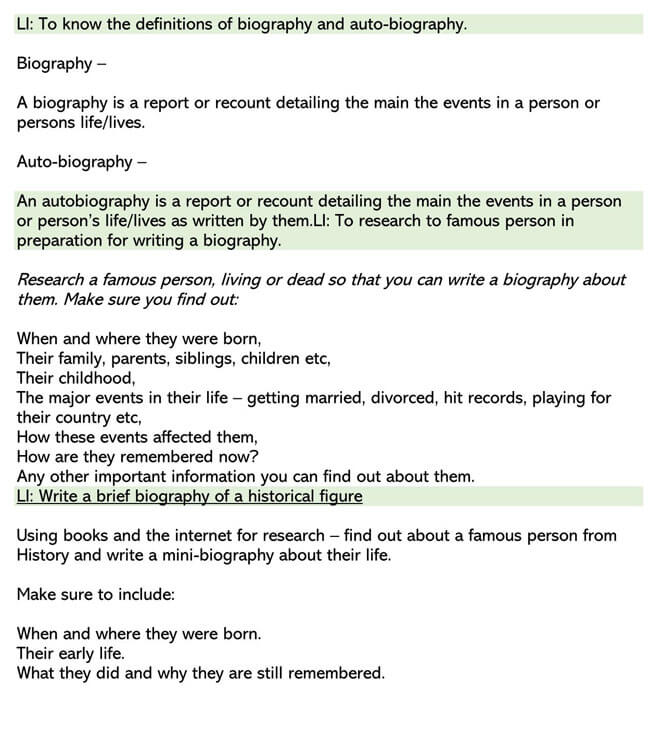
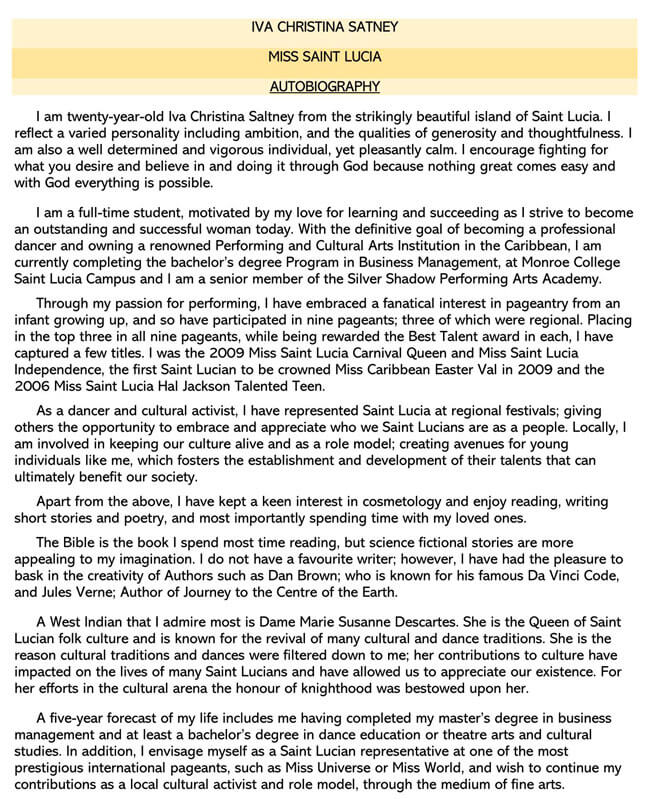
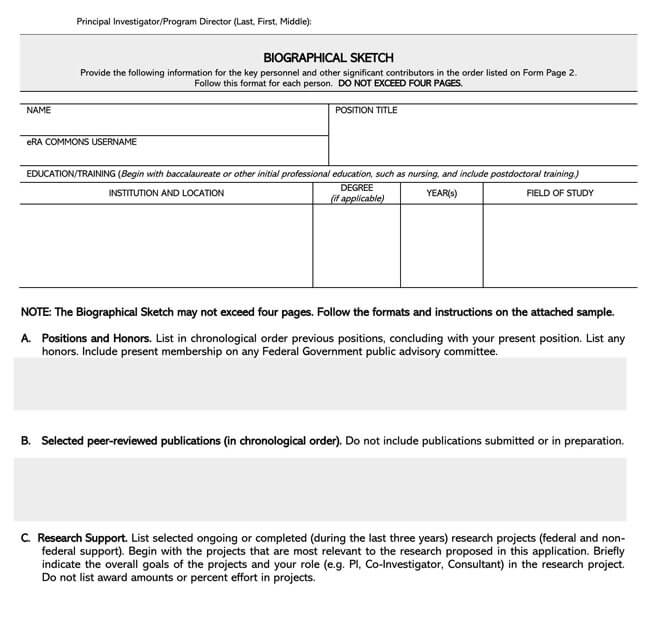
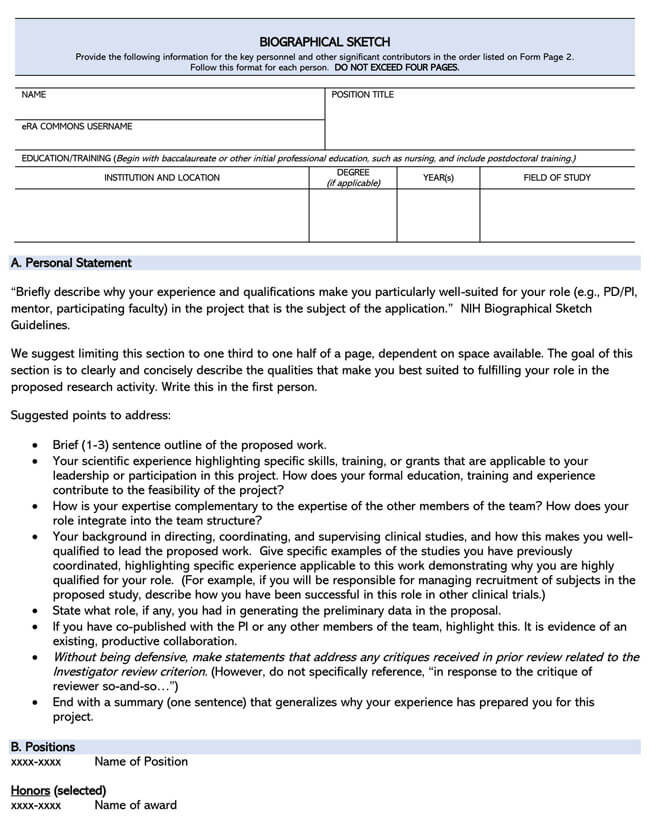
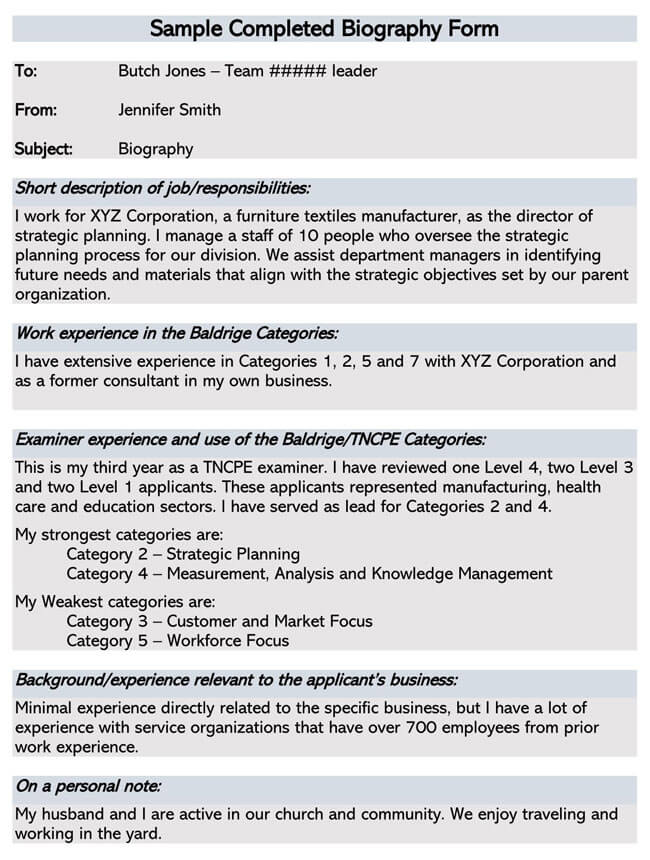
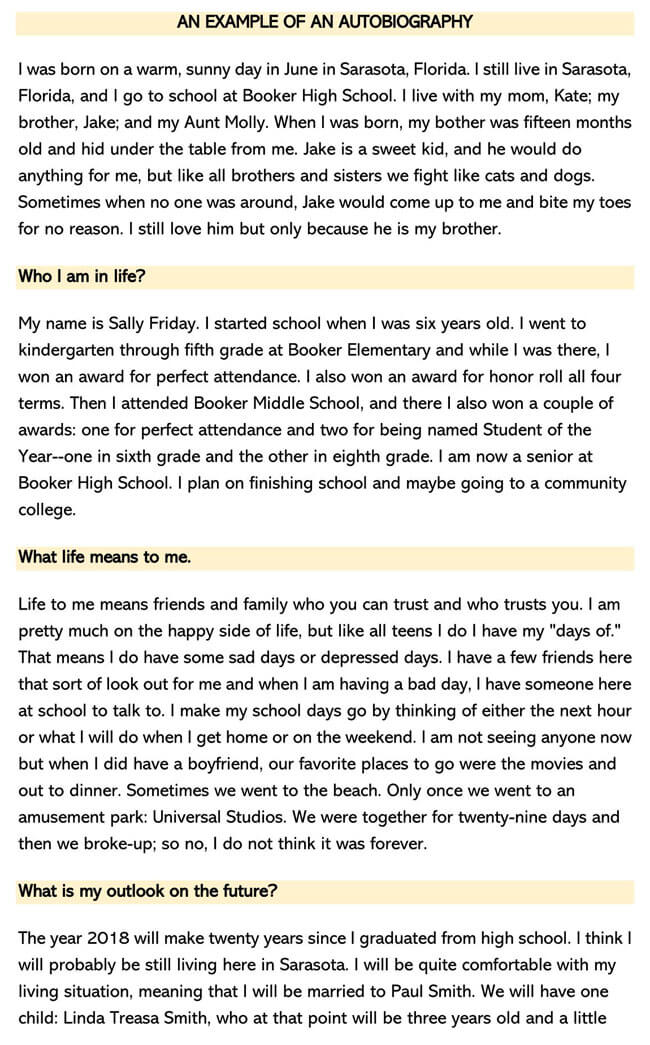
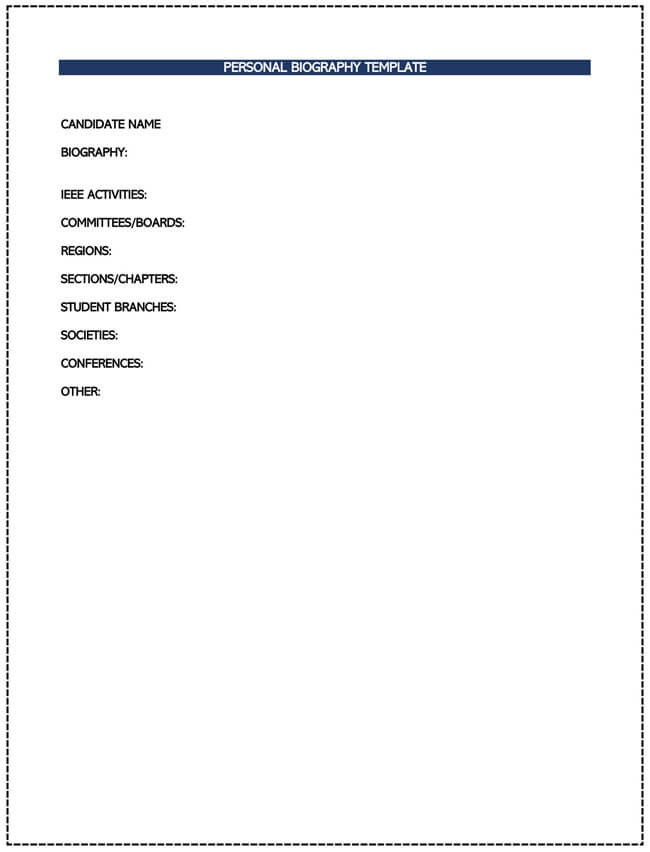
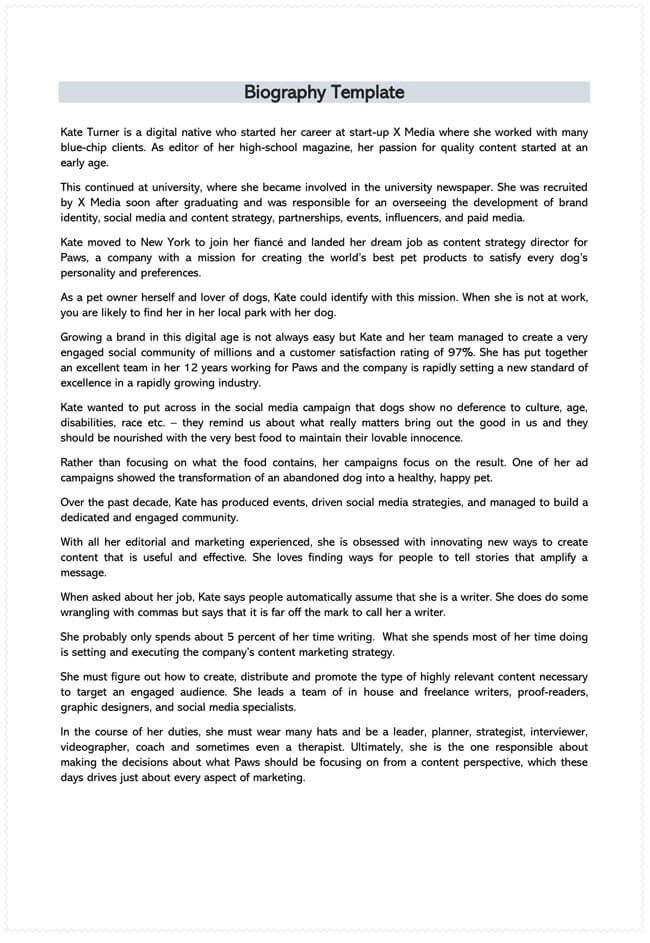
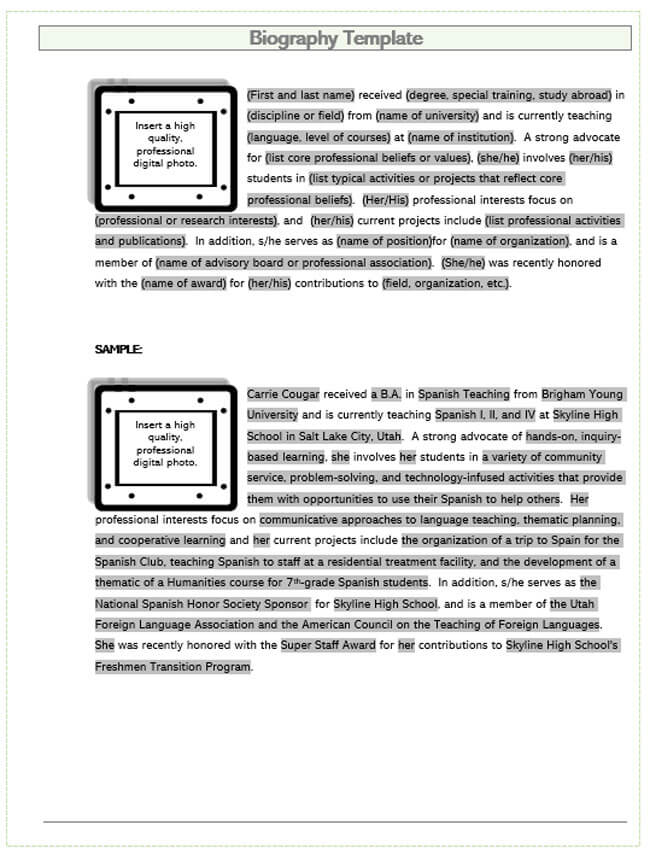
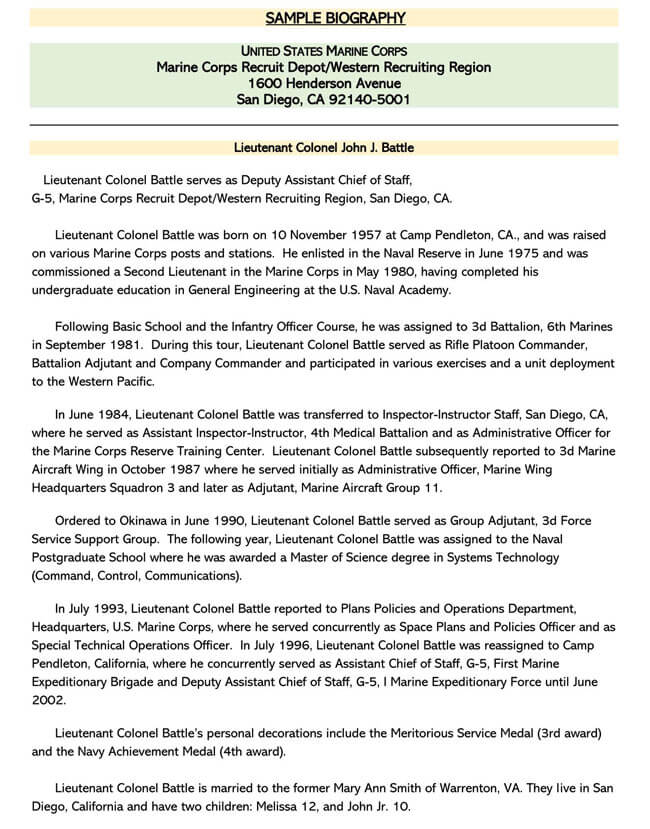
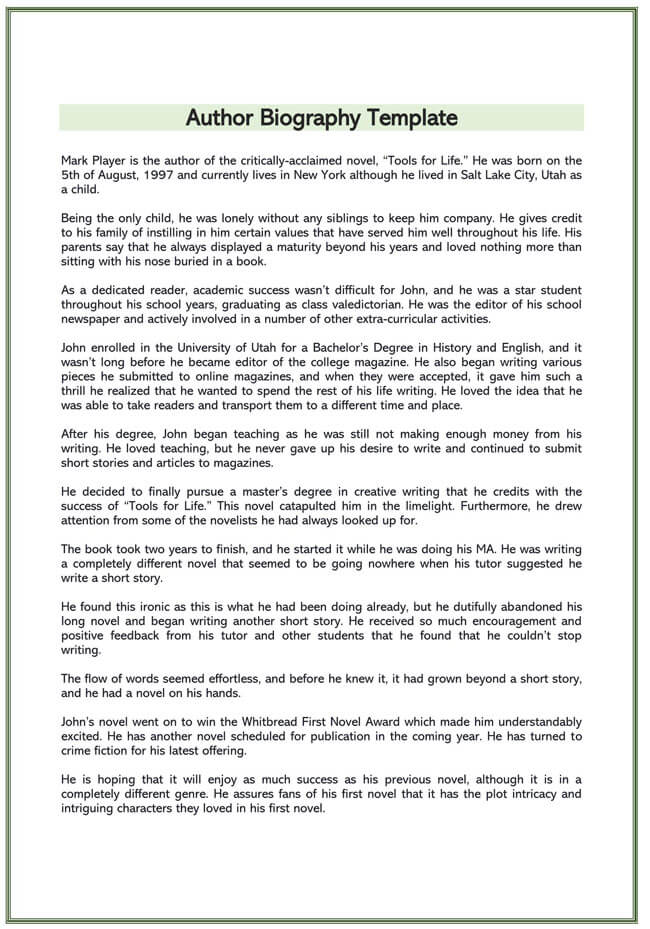
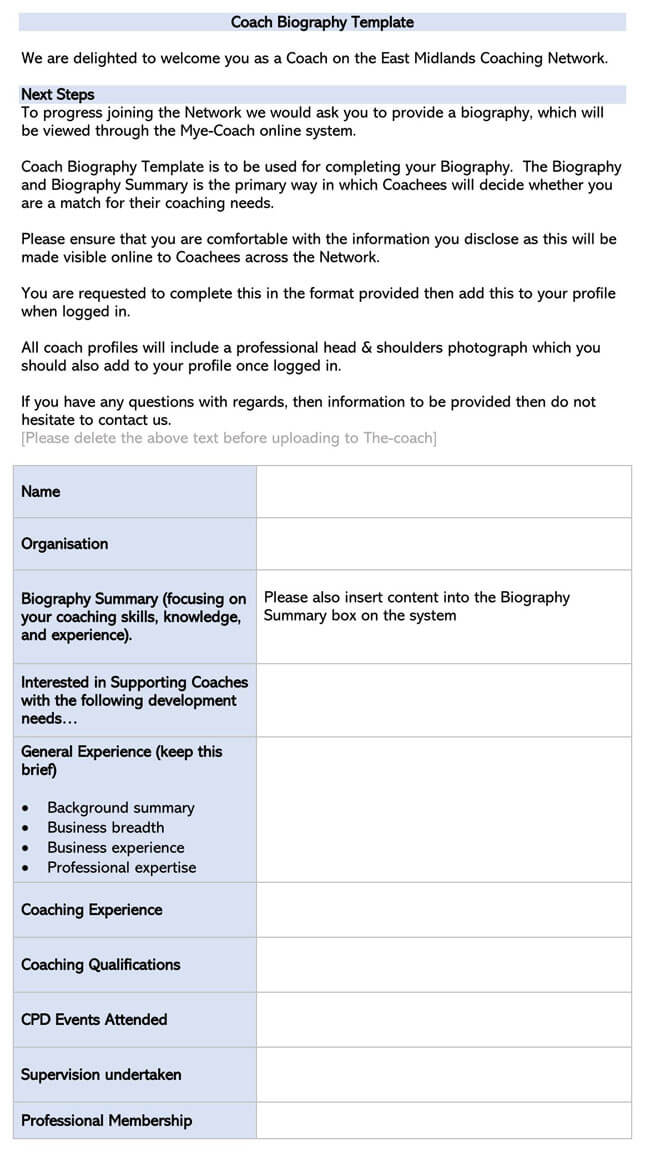
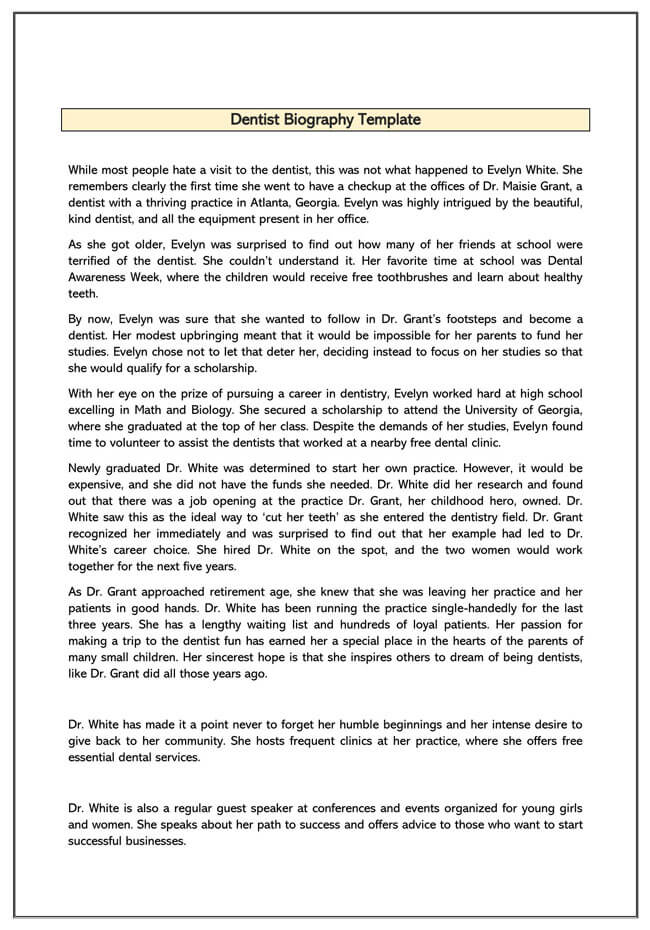
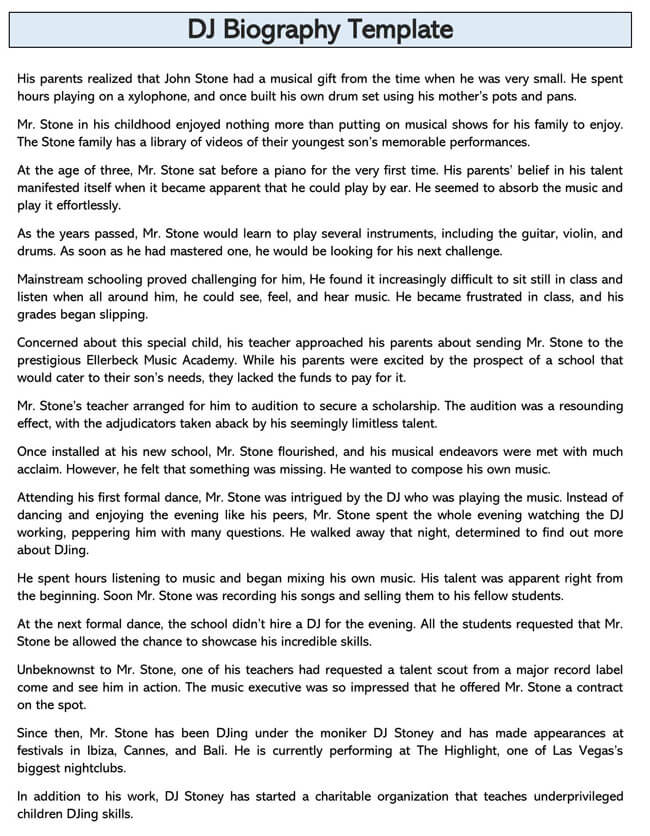
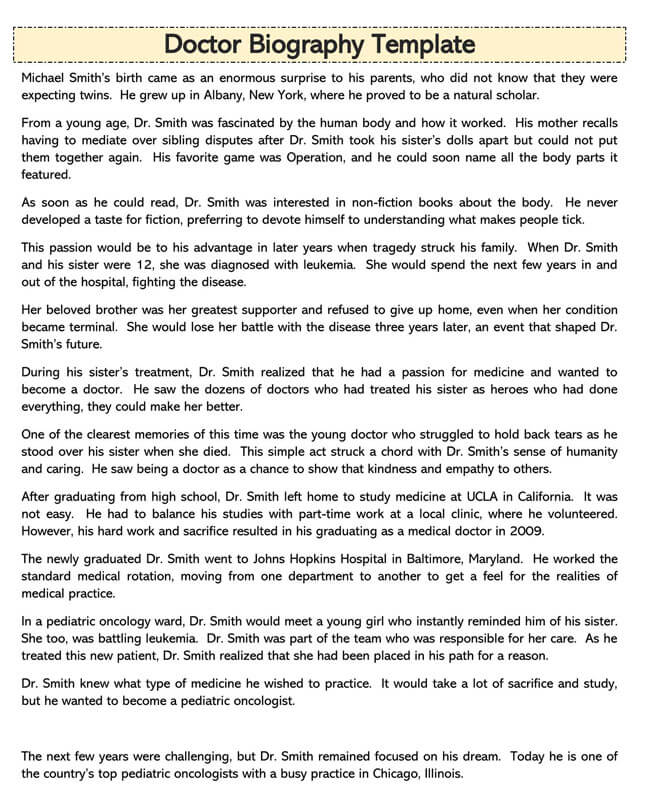
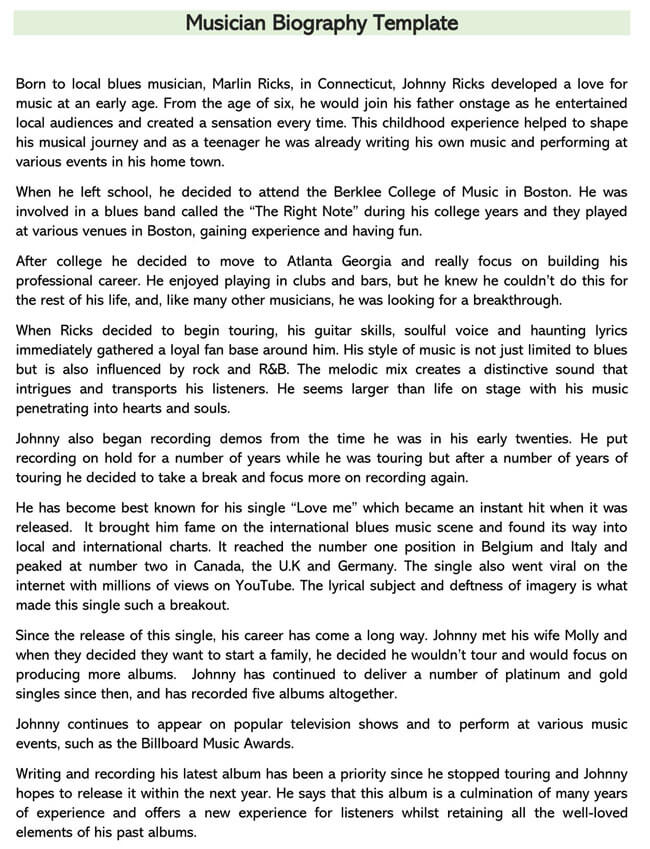
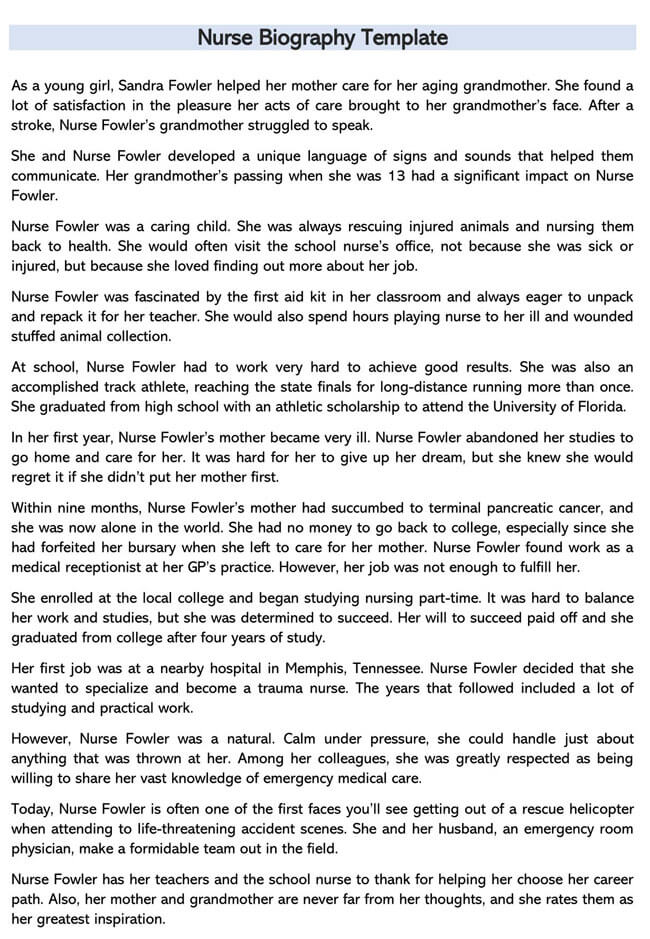
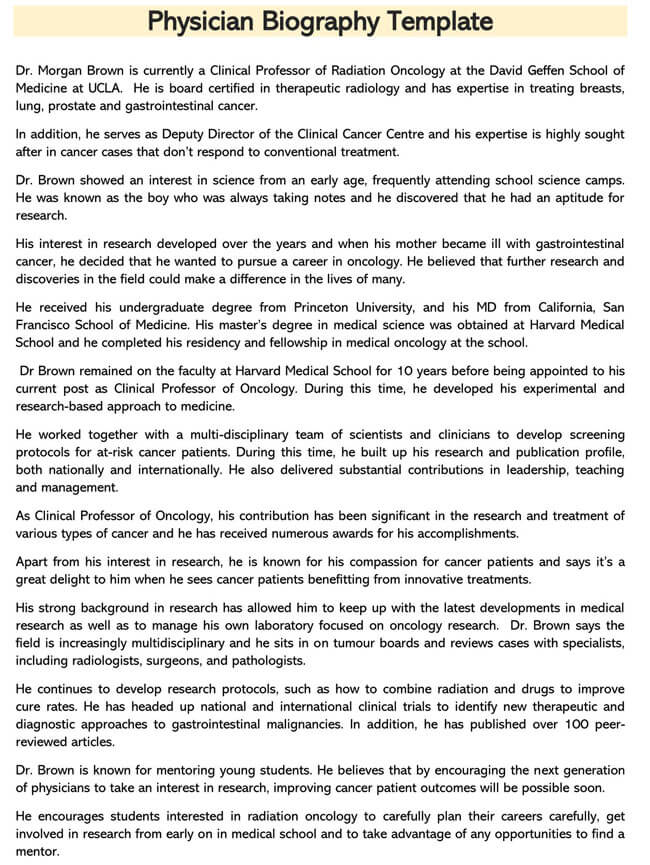
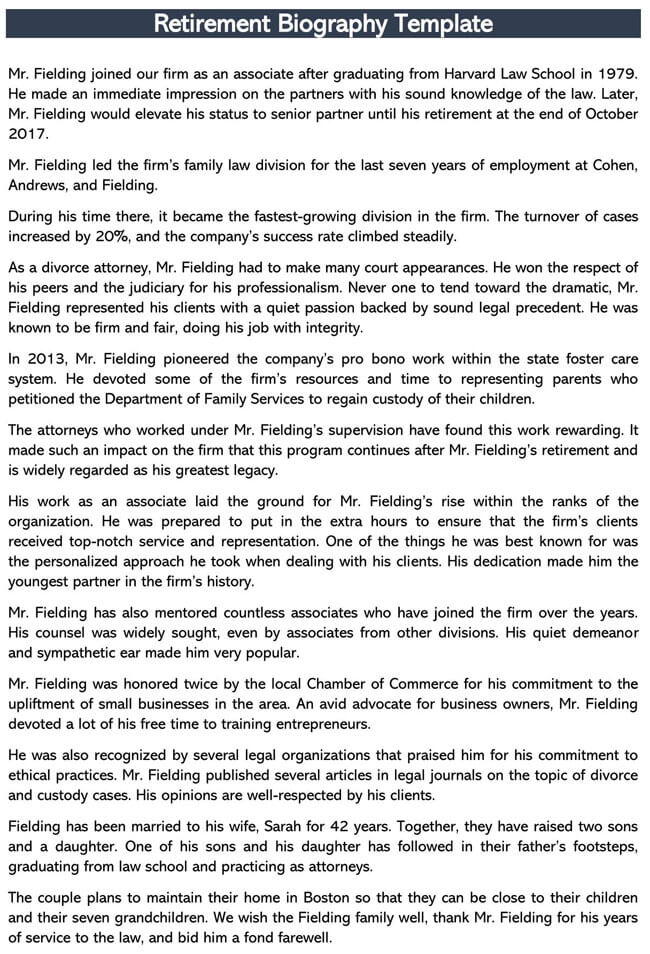

Biography Vs. Autobiography
A biography, an autobiography, and a memoir both tell a person’s life story. Distinguishing between these three formats can be challenging as they both have some common similarities. However, there are some distinct differences between these three formats, as is discussed in the section that follows:
A biography is the life history of an individual, authored by someone else.
On the other hand;
An autobiography is the story of an individual’s life, written by themselves.
One major distinguishing factor between a biography and an autobiography is that the author of a biography is not the subject. The biographer writes about the subject’s life history and the events that shaped their lives from various research sources such as reference books, essays, photographs, diaries, letters, interviews, etc. In an autobiography, the author is the subject, and he/she is the main character of the story. Thus, autobiographies tend to be more subjective.
A biography is usually written to inform and establish context. In contrast, an autobiography is written to inform and describe the motivation and thoughts behind the author’s actions and decisions.
An autobiography offers access to the personal thoughts and feelings of the author as they are the subject. At the same time, a biography has restricted access to the subject’s thoughts and feelings since the author is not the main character of the story.
A biography is written in the third person format, while an autobiography is written in the first person. The final difference between a biography and an autobiography is that a biography can be written anytime, while in the case of an autobiography, the account is written later in the subject’s life.
6 Steps to Write a Personal Biography
Now that you have already understood what a personal biography is and you are better positioned to distinguish between a biography and an autobiography, the next thing you should understand is how to effectively draft a professional biography. When writing a personal biography, you should have a few important things at the back of your mind. These items are usually standard, and they apply to almost all professional bios.
Follow these simple steps to craft your personal biography as a pro:
- Write a proper self-introduction
- Make your personal biography brief
- Write it in the third person format using third-person pronouns
- Include a well-planned story
- Provide your contact information
- Before submitting your biography, review it thoroughly
These points are elaborated below :
Write a proper self introduction
Knowing how to introduce yourself properly is the first step of writing a great personal biography. I know you might be wondering how to introduce yourself properly. It is simple- Write your name first! Your readers need to know who you are before they proceed reading to find out what you do. Remember that your most important details, such as your education, accomplishments, and certifications, should be written in the first sentence.
After writing a nice introductory paragraph that sparks interest, write your passions, values, and general outlook on life professionally and humanly. You can achieve this by highlighting your key skills, the attributes that make you exceptional in whatever you, your personal values that helped shape what you are currently, and the goals that you have in your professional life.
Keep your personal biography brief
Determining the length of the bio before finishing it might seem like a daunting thing. But you must narrow down your information to make the entire biography brief. Depending on your primary focus and purpose of the biography, your word count can vary.
Suppose you are writing your personal bio from an SEO perspective. Then the more the words, the better. If you are writing your personal biography on a resume or job-search site such as LinkedIn, keep your word count between 300-600 words. You should use either a single paragraph or a few short paragraphs to explain precisely who you are. Keeping your bio concise helps you capture your audience’s attention and encourage them to read the rest of your bio.
While writing a bio for your professional website, the total word count should be 1500-2000 words. In this scenario, include as many details as possible but don’t be too detailed either.
When writing your personal biography, it is very important that you include your purpose for writing the given bio. You should be able to answer the “why” and “what” questions properly to the reader. After providing the reader with the purpose for your writing the bio, talk about the professional goals you have accomplished so far, the kind of awards and accolades you have received, if any, and whether or not you have exceeded your job goals and responsibilities- especially if your reader is a potential employee or client.
The next thing to include in your bio should be your background history. Give a brief but detailed explanation of your history, considering the aspects of your personal background that contributed to who you are today. While writing this section, highlight the events of your personal life that shaped your career line.
After that, talk about your educational background and the credentials that you have. In this section, you can write about where you schooled, what you studied for, and include educational awards or certificates you received from the various schools you attended.
If you have much information that you feel should be part and parcel of your biography, remember to organize this information, starting with the most important to the least important to encourage your reader to keep on reading. While at it, don’t forget to remove any irrelevant information that does not align with your bio’s purpose to guard your credibility.
Write your biography in the third-person format
As seen earlier, biographies are usually written in the third person. This makes them sound more objective and unbiased. While writing in the third person is difficult for most people- I mean, how do you talk about yourself in the third person? It is very beneficial to do so- especially informal settings.
From an SEO perspective, writing in the third person allows you to include your full names. This is very useful as it helps tell the reader that the piece provided is about you. However, avoid overusing your name as it makes the whole thing unnatural. Your name in a bio should come out as a natural inclusion. Only include it when it is appropriate.
Write a well-planned story
When drafting your personal bio, it is easier to find yourself talking more about your accomplishments instead of anything else. In as much as it is important to write about your achievements, avoid over mentioning them. Your bio should go over and beyond your awards and get to the core of who you are and what your brand is about. This might seem challenging, but if you plan your list well, you will achieve this. While writing this part, ask yourself questions like, who is your audience? What lesson do you want to convey? Which life events in your life best illustrate those main points? Convert your biography to a compelling story that engages the reader and draws their attention to want to know you more.
Once you master the art of writing your personal biography as a story, you are allowing yourself the chance to differentiate yourself from others and connect with the reader. Remember to focus only on accomplishments that relate to a variety of professional skills or the ones that relate to your proficiency and competence.
Provide your contact information
Your contact information should appear in the last sentence of your personal biography and should be easily visible. This is especially true if you are writing a bio that you will later publish on your website. Providing your contact information encourages your readers to communicate with you as it makes you appear like an open-minded and approachable person. You can include your email address, a link to your professional social media pages such as LinkedIn and Twitter, or a link to your contact page. However, you should be aware of online scammers.
Edit thoroughly
Your bio needs to reflect you in the best way possible. Therefore, it should be updated regularly and edited every time you achieve something new. A well-written, regularly updated personal biography is like a well-optimized search engine. As you gain more experience or, rather, whenever you shift your professional focus, you should always update those changes in your bio.
Writing a personal biography is a continuous process. The work is never truly finished. Therefore, after drafting your longer version of the personal bio that you intend to use on your website or for job-searching reasons, keep in mind that you will have to update it later and edit it where necessary.
After writing your bio, make sure to edit it thoroughly to ensure that it is grammatically correct and well-punctuated. This way, you will write a great personal bio that keeps your readers engaged and glued to your story. You can edit your work using online editing software such as Grammarly. You can read your work out loud to identify areas that need grammatical improvement, and you can ask a friend or family member who is objective to go through your piece and provide honest feedback on areas that need to be improved. It is also important that you avoid editing your work as you write. Instead, edit the entire document once it is complete to achieve a smoother flow.
Tips to Appear Professional in Personal Biography
To write a personal biography that will make you different from the rest of the crowd, you must understand how to make an all-important human connection while creatively showcasing your major accomplishments. It would be best if you do not come out as all-boastful to your readers.
Here are some of the best tips to make your personal bio noticeable:
Use humor where it is appropriate
Using humor in your personal biography is a great way of connecting with your audience. While you should maintain a professional tone throughout your piece, it is a good idea to include a humorous note upfront or at the end of your bio. However, you should first understand your target audience and know what type of joke is appropriate. Making your audience laugh as they read your story helps create a lasting impression on them, thus setting you apart from your peers.
Provide a link to your portfolio
The primary goal of writing a personal bio is to showcase yourself out there and to tell your readers what you have done. Nevertheless, you cannot fully achieve this goal if you fail to include links to examples of your best work in that given field. The links that you provide should anchor and illustrate what you’ve already described yourself. They should not contradict the main thrust of your personal narrative or be a distraction to your readers.
If you have a lot of work and accomplishments to choose from, just pick what you feel is most important, impressive, relevant, or one that tells your story in a way that makes you feel proud. While providing the links to your work, ensure that you use relevant anchor text. The words you choose to use should tell your readers what to expect when they click on the links you’ve provided.
Utilize search engine optimization
Your personal biography should be search engine friendly. This means that you have to watch your word count and make it longer. Your content should also be original, and you should write in the third-person format using third-person pronouns. Search engines value diversity. So, if you use the same bio for many sites, the chances are that only one of them will pop up on the first page of your search results, which most readers tend to overlook.
If you use various personal bios across different sites, then it is most likely that several of your bios will appear on your search engine results, meaning that you will end up with a wider online presence.
Other approaches that you can use to improve your SEO include; using relevant keywords that are related to your field or industry, including links to your social media pages such as Twitter and LinkedIn, adding a professional photo of you that is High-Definition quality, and including internal links to your website or outside work where applicable. All these methods are aimed to promote and market your brand to your readers.
Manage your online presence
Personal biographies are essential, but they only form part of your personal brand. The rest of your online presence should connect with your personal biography rather than contradicting it. This means that you have to find ways to manage your online presence.
First, you need to ensure that all the photos and posts posted on your websites, portfolios, and social media sites are professional. Secondly, countercheck the skills and tone across all your channels online to make sure that it is consistent. Lastly, consider googling yourself online to check for inappropriate or incorrect information about you or your brand.
By doing this, you are allowing yourself an opportunity to convey a consistent and compelling message that you want your readers and prospective employers to come away with.
Do not write in list form
A bio is not a resume. Therefore, avoid writing it in list form. You should not just give a list of your jobs and career awards and recognitions. Rather, present your professional life as a story using story-telling techniques.
Frequently Asked Questions
It depends on the purpose of the biography. If you are writing a bio for your social media page or for a job-searching site, keep it short. Your word count should be somewhere between 200-300 words.
From an SEO perspective, the length of your bio should be longer. The word count should be around 1500-2000 words. The same applies to when you are writing a personal biography for your official website. In these scenarios, you should include more details while remaining relevant to the scope of your work.
Biographies portray the experiences and events that have occurred in a person’s life. Therefore, they are written chronologically, starting with the person’s early life, educational background, personal achievements, and professional accomplishments. However, shorter bios tend to focus more on one specific area in a person’s life.
Conclusion
A personal biography is a well-written short account of who you are, your academic qualifications and your most notable accomplishments in life. Personal biographies shouldn’t be too wordy. They should focus more on what is most important. Personal biographies should not portray you as being too boastful. Instead, you should use your bio to showcase your achievements creatively and tell your story in a good and compelling way that leaves a lasting impression on your potential employers and readers. This way, you will differentiate yourself from your peers and have a better chance of getting your dream job in today’s competitive job market.




